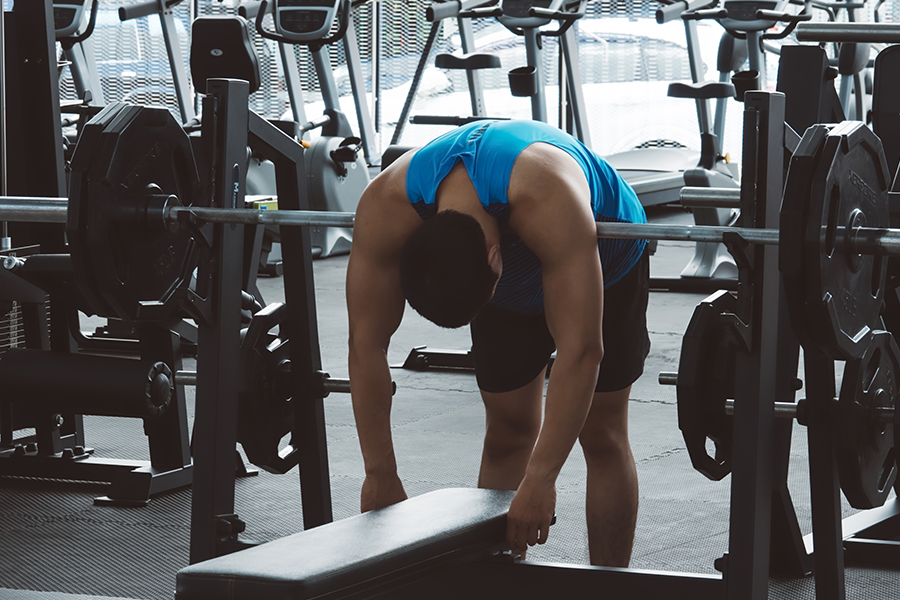Overtraining is a common problem these days amongst beginners; if overlooked, it can later affect a person's health. Some athletes go overboard with training, such as working out straight for seven days a week. Little do they know they are landing themselves into trouble with an intense workout.
"Testosterone is key to building muscle and strength. But overtraining can lead to a decrease in testosterone levels, so it's important to train smart and not overdo it."- Dorian Yates, six-time Mr. Olympia bodybuilding champion.
That said, there needs to be moderation in terms of training. Intense training can cause fatigue and affect your muscles and joints. If you ever feel such signs, remember that this is your body's way of communicating, and ignoring it means harming yourself.
Related Article: Overtraining: What It is, Signs, and Recovery
Association Between Testosterone and Overtraining
There's a relation between training and Testosterone levels. Testosterone is a sex hormone that raises the sex drive and keeps sufficient sperm count. You must follow a healthy diet and routine to keep your T levels normal.
Testosterone is an important hormone for muscle mass and strength gain. However, when it comes to overtraining, it can be a double-edged sword. If you are overtraining, your testosterone levels can drop significantly, leading to decreased performance, lower energy levels and even depression. Research supports that a low level of testosterone causes depression and anxiety.
According to a study, athletes who underwent intense training decreased their sperm count. In addition to this, they faced reproductive issues due to hormonal imbalance as well.
On the other hand, if you maintain optimal training protocols and adequate recovery time, your testosterone levels will remain high and help promote muscle growth and strength gains.
Therefore, it's important to monitor your testosterone levels when engaging in intense training sessions or any physical activity that could put additional stress on the body. Proper supplementation with essential vitamins and minerals can also help maximize the effects of testosterone while reducing the risk of overtraining.
Overall, testosterone and overtraining go hand in hand when it comes to achieving long-term success with your fitness goals. With the right balance of exercise, recovery and nutrition, you can use testosterone to your advantage for increased strength and muscle mass!
Related Article: Does Working Out Increase Testosterone?
Signs & Symptoms of Overtraining

Some of the symptoms associated with overtraining causing lower T levels are discussed below. If you sense these symptoms, look at your training routine and consider consulting a medical professional.
Fatigue
An intense workout can cause exhaustion and tiredness. Get your testosterone level checked if you feel these signs off and on during a workout. Overtraining can cause weakness by decreasing your T-levels.
Low Libido
Overtraining is a common issue but did you know that overtraining can actually lower your testosterone levels and wreak havoc on your libido? It's true.
When you push your body to its limits day after day, you're actually putting a strain on your hormonal balance, which can lead to decreased sex drive and other negative side effects.
So if you're noticing a decline in your desire for intimacy or other signs of low testosterone, it might be time to re-evaluate your training regimen and give your body the rest it needs to recover and recharge. Don't let overtraining take a toll on your health- listen to your body and take action to keep your hormones in check.
Reduced Bone Mass
When it comes to testosterone levels, overtraining can lead to reduced bone mass, which is a serious problem for both men and women. Testosterone plays an exceptional role in building muscle protein. If you feel weakness in your bones and muscles, it could be due to low testosterone levels.
Weight Gain

One of the signs and symptoms of overtraining is weight gain. This can be attributed to changes in testosterone levels. When you overtrain, your body produces excess amounts of cortisol, a stress hormone, which can lead to an increase in body fat.
Additionally, overtraining can also have negative effects on testosterone levels, which can further contribute to weight gain. By recognizing the signs and symptoms of overtraining, including weight gain, you can make adjustments to your exercise routine and achieve your fitness goals safely and effectively.
Hair Loss
Are you feeling more tired than usual, experiencing constant muscle soreness, and noticing an unusual amount of hair loss? These could be signs of overtraining, a common issue among athletes and fitness enthusiasts.
And when testosterone levels drop, hair loss is often a noticeable symptom. So if you're experiencing any of these symptoms, it's important to take a step back, reevaluate your exercise routine, and give your body the rest it needs to recover. Remember, taking care of yourself is just as important as pushing yourself to your physical limits.
Infertility
Testosterone is a hormone responsible for sperm production. If you experience a lower sperm count, it could be due to low testosterone levels. According to the study, low T levels cause reproductive issues and infertility. This can be particularly devastating for men who are trying to conceive with their partners.
Other symptoms of overtraining include fatigue, irritability, and decreased performance. Overtraining can also increase the risk of injury, which can further impact an individual's ability to maintain their physical fitness. It is important for athletes and fitness enthusiasts to listen to their bodies and take rest days when necessary to avoid the negative consequences of overtraining, such as infertility.
Related Article: 12 Mistakes That May Be Hindering Your Progress at the Gym
Does Intense Training Lower Testosterone Levels?

Over the years, several types of research studies have been conducted which examine the effects of overtraining on the reduction of testosterone levels. Intense workouts such as heavy weight lifting, excessive running, or cycling can significantly lower testosterone levels. In a study, athletes with normal hormonal backgrounds were tested. They went through over-training; later, their testosterone level and sperm count were seen to have reduced.
Similarly, another review supports lowering sperm levels by 50% because of excessive cycling. Due to intense cycling, the testis glands of the cyclists were badly affected. It took them a few days to come back to normal. Besides the effect of overtraining on testosterone, it impacts other body parts too.
A highly reliable study reveals the effect of overtraining on destroying the body's healthy cells. In addition, it increases oxidative stress and cytotoxins levels in the blood, disrupting mood and sleep.
Last but certainly not least, many similar studies show the same results concluding that excessive training disrupts the testosterone levels in the body. Further, overtraining causes stress, which prevents the person's body from maintaining normal testosterone levels. Further, it is important to rest and sleep well to take your body back to its normal state.
How to Prevent Overtraining & Elevate T Levels?

Most people overtrain to attain an attractive body. But they forget that excessive training will do them no good. In addition to this, over-training affects the endocrine and nervous systems. If you want to maintain the balance between training and testosterone levels, follow the following steps.
Get Enough Sleep
When you sleep well, you work well. A review suggests a person should sleep at least 9 hours a day since cells need time to recover. The person should get sufficient sleep to work out actively the next day.
Take Supplements

If you are a victim of overtraining, you need to take nutritional supplement i-e, testosterone booster along with healthy food. It helps you combat the loss of vitamins and minerals during the training.
Take Rest Between Workouts
Another thing you can do is rest between the training. You can take two days off after every workout. It will help you fix the mind-body connection, recover the muscles and provide you with energy to work out.
Record Your Progress
You can keep track of your progress. For that, you can take a diary and write down your performance. It will help you evaluate your training and pick out the weak points. Furthermore, doing so will help you be consistent with the workout.
Consume Calories:
When you do an intense workout, it deprives your body of various nutrients. To recover from the loss, you must take carbohydrates, add whey protein powder, and healthy fats into the diet.
Reduce the Intensity of Your Workout
You can decrease the number of sets you do per exercise or reduce the weights you lift. It will help you work out without any exhaustion. Lastly, you will also recover from the wear and tear of overtraining.
Get a Massage
Treat your body with a good massage if you're tired and exhausted
from overtraining. A soothing massage will help you overcome injuries, release muscle tension and restore balance to the musculoskeletal system.
FAQs
1. Can overtraining lead to other health issues besides decreased testosterone levels?
Yes, overtraining can lead to a number of health issues, including increased risk of injury, decreased immune function, disrupted sleep patterns, and mood changes such as irritability and depression.
2. Is it possible to have high testosterone levels without overtraining?
Yes, it is possible to have high testosterone levels through a combination of genetics, a healthy lifestyle, and regular exercise that is done in moderation with proper rest and recovery.
3. How long does it take for testosterone levels to recover after overtraining?
It varies from person to person, but it can take anywhere from a few days to several weeks for testosterone levels to recover after overtraining. It's important to give yourself enough time to rest and recover to avoid prolonged or chronic low testosterone levels.
4. Can testosterone replacement therapy be used to restore testosterone levels after overtraining?
Testosterone replacement therapy (TRT) may be used to restore testosterone levels if they are significantly low due to overtraining or other factors. However, TRT should only be used under the guidance of a healthcare provider and should not be used as a way to enhance athletic performance.
Takeaways
There are some mistakes that people make while working out. They think working out more than recommended will help them get fit. When they are involved in intense workouts, they face overtraining. This overtraining causes them several bodily disruptions, such as fatigue, mood swings, weight gain, and exhaustion. It's why moderation should be considered in everything, whether it be a workout or anything else. However, you can cure the damage by following a healthy routine, getting good sleep, and consulting a professional trainer.
Reading List
Article Sources
- Celec, P., OstatnÃková, D., & Hodosy, Jã. (2015). On the effects of testosterone on brain behavioral functions. Frontiers in Neuroscience, 9. https://doi.org/10.3389/fnins.2015.00012
- Redman, L. (2006). Reproductive BioMedicine Online; www.rbmonline.com/Article/2179 on web. 12(5), 579-586. https://www.rbmojournal.com/article/S1472-6483(10)61183-2/pdf
- Arce, J. C., & De Souza, M. J. (1993). Exercise and Male Factor Infertility. Sports Medicine, 15(3), 146-169. https://doi.org/10.2165/00007256-199315030-00002
- Kreher, J. B., & Schwartz, J. B. (2012). Overtraining Syndrome. Sports Health: A Multidisciplinary Approach, 4(2), 128-138. https://doi.org/10.1177/1941738111434406
- Arce, J. C., & De Souza, M. J. (1993). Exercise and Male Factor Infertility. Sports Medicine, 15(3), 146-169. https://doi.org/10.2165/00007256-199315030-00002
- Roberts, A. C., McClure, R. D., Weiner, R. I., & Brooks, G. A. (1993). Overtraining affects male reproductive status*. Fertility and Sterility, 60(4), 686-692. https://doi.org/10.1016/s0015-0282(16)56223-2
- Lucia, A. (2001). Hormone levels of world class cyclists during the Tour of Spain stage race. British Journal of Sports Medicine, 35(6), 424-430. https://doi.org/10.1136/bjsm.35.6.424
- Mackinnon, L. (2000). Overtraining effects on immunity and performance in athletes [Review of Overtraining effects on immunity and performance in athletes].
- Kreher, J. B., & Schwartz, J. B. (2012). Overtraining Syndrome. Sports Health: A Multidisciplinary Approach, 4(2), 128-138. https://doi.org/10.1177/1941738111434406








